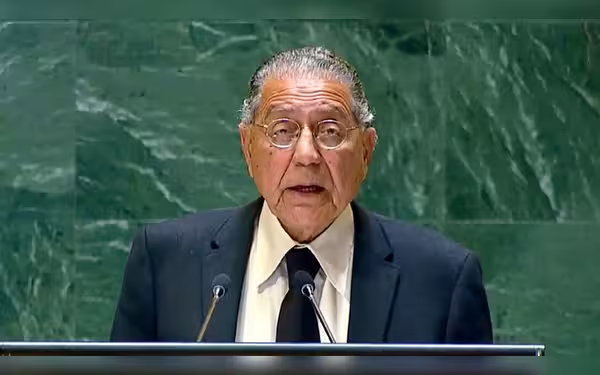Saturday, November 16, 2024 05:58 PM
Pakistan Rejects Expansion of UNSC Permanent Seats
- Pakistan opposes new permanent seats in UNSC.
- Ambassador Akram highlights existing UNSC challenges.
- Calls for equitable representation in global governance.
 Image Credits: radio.gov.pk
Image Credits: radio.gov.pkPakistan firmly opposes the addition of permanent seats in the UNSC, advocating for reform and equitable representation in global governance.
In recent discussions at the United Nations, the topic of expanding the UN Security Council (UNSC) has resurfaced, igniting debates among member states. The UNSC, which is responsible for maintaining international peace and security, currently has five permanent members: the United States, the United Kingdom, France, Russia, and China. These nations hold significant power, including the ability to veto any substantive resolution. As global dynamics shift, many countries have called for the addition of new permanent members to better reflect the current geopolitical landscape.
Pakistan has firmly opposed any proposals aimed at creating additional permanent seats in the UNSC. During a recent statement delivered at the UN General Assembly, Pakistan’s Permanent Representative to the UN, Ambassador Munir Akram, articulated the nation’s stance. He argued that adding new permanent members would exacerbate the existing paralysis within the Security Council rather than resolve it. Ambassador Akram emphasized that the current structure of the UNSC is already fraught with challenges, and introducing more permanent seats could lead to further complications in decision-making processes.
Pakistan's position is rooted in the belief that the current system is not only outdated but also ineffective in addressing the pressing issues of today. The country advocates for a more equitable representation of nations in the UNSC, particularly for those from the Global South. By opposing the expansion of permanent seats, Pakistan aims to highlight the need for reform that prioritizes inclusivity and fairness over mere expansion of power.
This debate is not just about seats at a table; it reflects deeper issues of global governance and representation. As the world becomes increasingly multipolar, the question arises: how can the UNSC adapt to ensure that it remains relevant and effective? The discussions surrounding the UNSC's structure are crucial, as they will shape international relations and the future of global peacekeeping efforts.
Pakistan's opposition to additional permanent seats in the UNSC underscores a significant concern regarding the effectiveness of the Security Council. As nations continue to navigate the complexities of international relations, it is essential to consider reforms that promote fairness and inclusivity. The future of global governance may very well depend on how these discussions unfold in the coming years.













